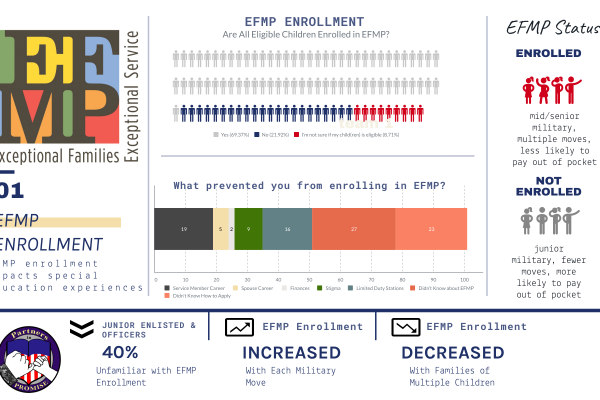
2021 Survey Data Featured in Military.com
| News, Resources, Survey Data
Survey Says Families Aren’t Using EFMP Because They Don’t Know How

2 Feb 2021Military.com | By Rebecca Alwine
A Pentagon-wide program designed to help military families with special needs receive services has one overarching problem, according to the results of a new survey: People don’t know enough about it.
In 2020, Partners in PROMISE, a grassroots advocacy organization with a focus on educating, advising and advocating for military family members with special health concerns, surveyed 456 individuals about the Exceptional Family Member Program, or EFMP, as part of its second annual survey.
The EFMP was started by the Army in 1979 as a voluntary enrollment program with the goal of providing medical support to families with special needs. Today, each branch of the military is required to administer its own version with mandatory enrollment. The program is designed not only to provide family members with outreach and medical support, but also to make sure they do not get stationed where services are not available or where weather and other local factors can exacerbate any conditions. About 140,000 individuals are enrolled in EFMP across the services, according to Partners in PROMISE.
But military families who use the program complain it is riddled with issues and inconsistencies. Because it’s designed to keep families from getting stuck in a place without needed services, it can also severely limit where they can be stationed, ruling out overseas or remote assignments needed for career advancement. And how the program is administered at a local level can largely depend on staffing and the experience of individual office employees. That lack of consistency prompted Congress to order a forced standardization across installations and branches as part of the 2021 National Defense Authorization Act.
Of those surveyed who had served approximately three years or less, 40% were unfamiliar with the enrollment process, while 27% and 23% of respondents respectively said they haven’t enrolled because they didn’t know about EFMP and didn’t know how to apply. About 20% said they had not enrolled because they believed doing so would negatively impact future military career options.
The survey also shows consistent problems moving students with an Individual Education Plan, or IEP — a plan that shows reasonable adjustments to help students learn best — something EFMP offices are supposed to help address. More than 40% of respondents with EFMP students said they had experienced problems when moving, due to IEPs being changed or not implemented. And 79% of them said they went over a month without EFMP services after a permanent change of station, or PCS, move.
While there are many resources available to military families with EFMP students, administrators may not be prepared to handle the number of people in the program, according to survey results. Most families need one-on-one assistance throughout a PCS, results showed, but wait times and the risk of never hearing back from staff push 27% of respondents to skip over military resources altogether. And more than half, or 54%, of survey respondents said that when their child’s IEP services were reduced, they received no prior written notice, a requirement under the Individuals with Disabilities Education Act.
Officials at Partners in PROMISE said they plan to work with the military community to address their survey findings, starting with education. To do that, they said, they need to focus on sharing information about the program, including dispelling myths, with a special focus on junior military members, who have the lowest rate of EFMP enrollment. But they also need to focus on bringing the entire family into the EFMP enrollment and information process, not just the service member.
They also said they want to work with the military to expand how long students can use their previous IEP after a move, while also giving them the chance to enroll with the gaining duty station’s EFMP office before they arrive.
“We observed that many families went without services for over a month, setting back educational progress and increasing stress for the whole family,” Jenifer Barnhill, Chief Operating Officer of Partners in PROMISE, said in an email to Military.com.
You can view the full survey results online. For more information on EFMP, including enrollment requirements and what to expect from local family support programs, start here.
–Rebecca Alwine can be reached at rebecca.alwine@monster.com. Follow her on Twitter @rebecca_alwine.





Leave a Reply